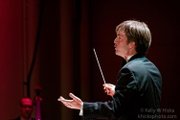After great pain, a formal feeling comes . . .- Emily Dickinson Before the final chamber music concert of the season at the Clinton Presidential Center here in Little Rock, there was a celebratory reception. It should have been a gala evening, but it was the night after the bomb blasts at the finish line of the Boston Marathon, and a pall still hung in the air. Like the dust and smoke on Boylston Street the day before.
Of course Boston would be a target for terrorism. With its libraries and museums, its universities and medical centers and classical music around every corner, its mix of brahmin High Culture and working-class Irish grit, it is a kind of cross-section of American civilization. On the way to a Red Sox game at Fenway Park, a fan might pass a young virtuoso playing in the T station, his violin case open for honoraria, or what we in these latitudes would call a freewill offering.
That’s Boston, that’s Western civilization, and isn’t that any terrorist’s real target, civilization itself?
Tonight, in a provincial capital a thousand miles and a regional culture away from Boston, that historic city’s sorrow and strength could be felt.
For after great pain, a formal feeling comes. A certain constraint. We were all Bostonians now.
The evening begins solemnly enough with a little Debussy, who is not only solemn but dull. The trio-flute, viola and harp-do a professional job, dutifully following the score, but they cannot supply what is not in the music.
Then comes what is supposed to be a fun piece by Crumb, Voice of the Whale, whose watery sounds would make a good accompaniment for a video tour of Boston’s aquarium.
But sound is not music, and this piece comes with some silly affectations like masks for the musicians. The masks are supposed to make them anonymous, which their talent would never permit.
Even for someone not crazy about the kind of mod music, the piece has its charms. The conceit of the composition is that it’s a history of prehistory, an archaeological exploration from the Archeozoic to the Cenozoic periods, ending with a sea nocturne composed for the End of Time. Each instrument-flute, cello, piano-echoes the other like undersea ripples, till archaeology ends and history is born-with all its beauty and terror.
Close your eyes and you can see the sea colors, greens and blues reflected in the light from above the waves, and envision the great heart of the whale pounding in slow motion and cello notes. There is an oceanic depth to the piece, like the ping of undersea sonar. “It’s magnificent,” as Ravel was supposed to have said of his Bolero, “but it’s not music.”
The same could be said of Voice of the Whale, which may be interesting, even riveting the first time you hear it, but would grow maddening with repetition. Once is surely enough. It goes on like a tour of a some great winding aquarium, exhibit after exhibit, till you long for the first exit sign and fresh air. On dry land.
Intermission comes like a reprieve.
Afterward, the real music begins as the familiar is woven together anew.
First comes a classical version of Amazing Grace (Higdon). Next on the program is the feature attraction of the evening, Aaron Copland’s old standby Appalachian Spring, newly arranged and imagined.
Now the sound of chamber music fills, then overflows the chamber. Packed with chairs for the overflow crowd, the great hall of the Clinton Center seems to grow greater, almost symphonic in its dimensions. For this version of Appalachian Spring calls for 12 instruments. That’s right-12. Four violins, two cellos, two violas, and one each flute, clarinet, bassoon, contrabass and, in tonight’s case, one talented young conductor.
Geoffrey Robson comes into his own once he’s got a baton in his hand, leading, coaxing, timing, inducing . . . . More than his own, for he becomes the music. This is what a great gift gives a man.
How fortunate we are to have Geoff Robson, not to mention the accomplished musicians he’s conducting tonight, many of whom are teachers in their own right.
The old Bible hymns that form the backbone of Appalachian Spring, composed as the most awful of wars was finally ending, can be picked out with the comfort of recognition, like safe harbor in a sea of troubles. After a great war comes great peace. The sweet past comes gently back, and we remember where and who we once were.
The swelling, restorative music ascends, buttressed by the themes from folksong after folksong, alternating between lush and lustrous, as if illuminated by light from above, culminating in the old Shaker hymn:
’Tis the gift to be simple,
‘tis the gift to be free
‘Tis the gift to come down
where we ought to be,
And when we find ourselves
in the place just right,
‘Twill be in the valley
of love and delight …
When true simplicity is gain’d,
To bow and to bend
we shan’t be asham’d,
To turn, turn will be our delight,
Till by turning, turning
we come ‘round right . . .
Somewhere in a mountain meadow, an eight-year-old boy who loved to run and climb, whose picture was in all the wire fotos out of Boston a week ago, plays forever. And the music, like simple gifts, never ends. There is no terror there, only peace. As there will yet be in this world. We shall overcome. Some day.
Paul Greenberg is editorial page editor of the Arkansas Democrat-Gazette. E-mail him at: [email protected]
Perspective, Pages 73 on 04/28/2013


